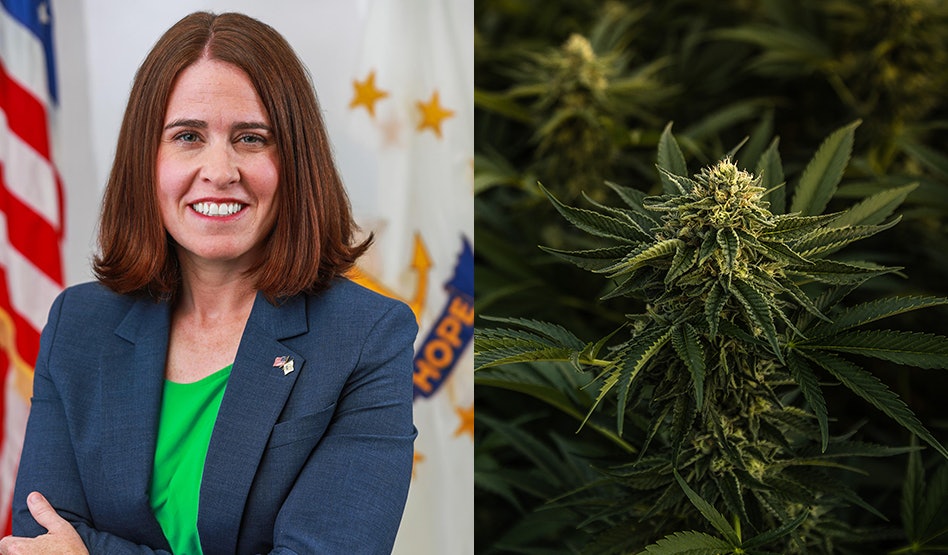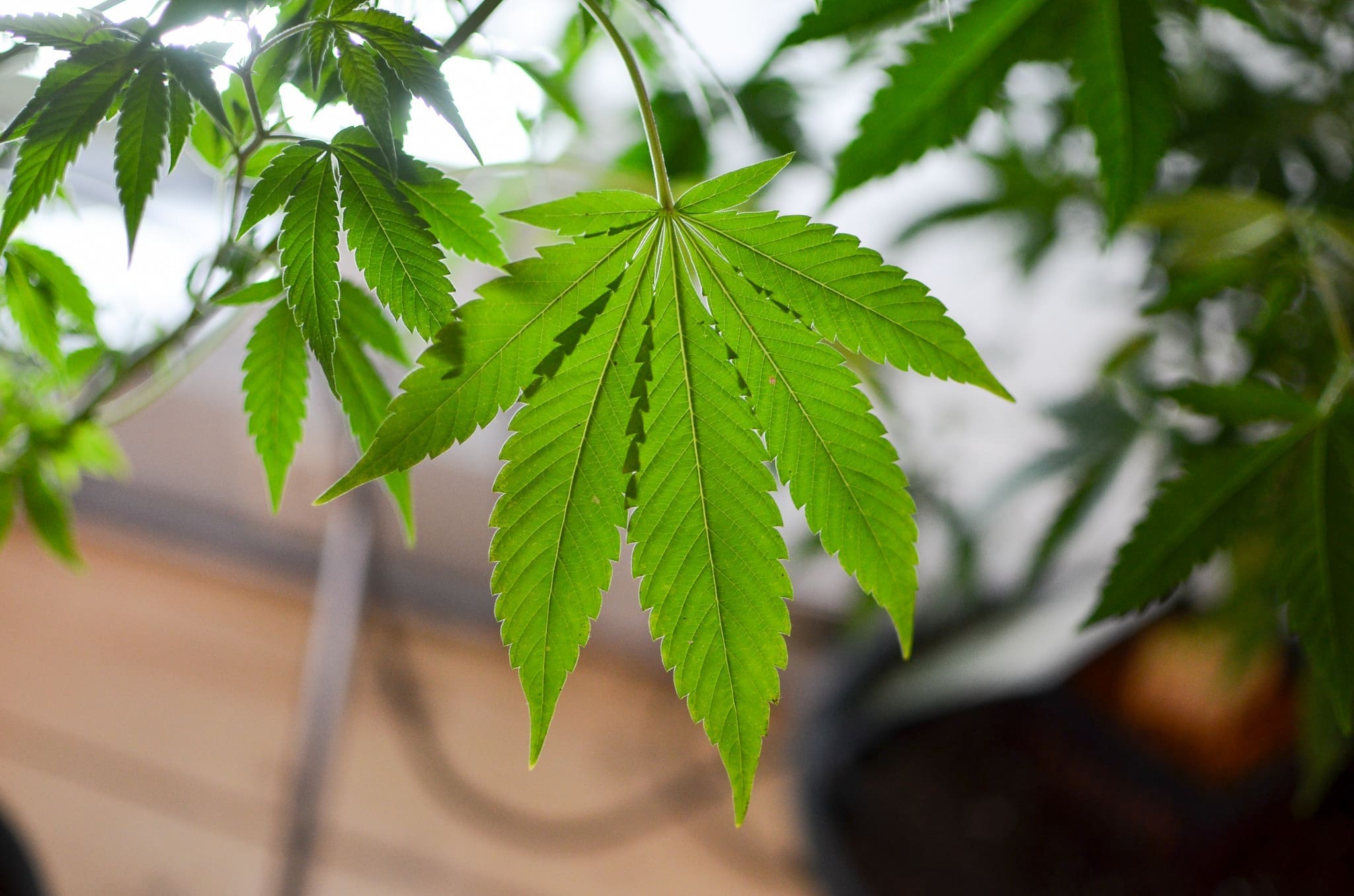featured
Rhode Island Cannabis Chair Steps Down; Adult-Use Dispensary Awards Months Away
Published
6 hours agoon

The Rhode Island Cannabis Control Commission (CCC) is down to two commissioners after Chairperson Kimberly Ahern, Esq., announced Oct. 21 that she’s bowing out.
Gov. Dan McKee nominated Ahern for the position shortly after adult-use sales launched in December 2022 via seven existing medical dispensaries that have had a massive head start on market newcomers: The state has yet to award 24 new adult-use retail licenses established under 2022 legislation, the Rhode Island Cannabis Act, which McKee signed into law.
The Rhode Island Senate confirmed Ahern as the inaugural CCC chair in June 2023 to oversee the state’s licensed and regulated cannabis industry. She previously served as McKee’s deputy chief of staff.
“When nominated for this position, I shared a goal for the new commission: to regulate Rhode Island’s adult-use and medical cannabis markets in a manner that is safe, transparent and equitable,” Ahern wrote Tuesday in a resignation letter to McKee. “That commitment has guided every decision during my tenure. Serving the state in this capacity has been a privilege, and I am proud of what we have accomplished in such a short time.”
Ahern’s decision to step down from her CCC post comes ahead of a likely run for attorney general in Rhode Island’s 2026 race, the Rhode Island Current reported.
McKee announced Oct. 21 that Ahern’s last day with the commission was that same day, thanking her for establishing the state’s adult-use regulations, launching a social equity application certification process, and opening the current adult-use dispensary license application period that runs through 4 p.m. on Dec. 29.
“She helped stand up the commission from the ground up and ensured that Rhode Island’s cannabis industry was launched with public health, safety and fairness as priorities,” the governor said. “I’ve had the privilege of working closely with Kim since her time in my office, and I’ve seen firsthand her professionalism and commitment to public service. We wish her the very best.”
Ahern’s resignation came one day after the three-member CCC set a timeline to award the 24 adult-use dispensary licenses to new market entrants.
Beginning on Jan. 1, adult-use retail applicants will have 60 days (until March 2) to demonstrate they have final zoning approval from their local municipalities, or they will be disqualified from a lottery process.
The CCC, which now includes just commissioners Layi Oduyingbo and Robert Jacquard, will have until the end of March to review the applications to determine whether they qualify – working with municipalities on zoning requirements – before conducting a “hybrid random selection process” that’s tentatively scheduled for May 2026.
“We reserve the right to delay this process depending on several external factors outside of our control,” Ahern said at the CCC’s regular meeting on Oct. 20. “If we receive thousands of applications, it will be hard for us to do that.”
Since Rhode Island’s existing medical dispensaries transitioned to adult-use operations in December 2022, they’ve sold more than $323 million in cannabis, including $246.6 million in adult-use transactions, according to the Rhode Island Department of Business Regulation (DBR). The state’s seven medical cannabis compassion centers had to pay a $125,000 fee to the DBR to transition to adult-use sales as hybrid retailers.
While $323 million in cannabis sales over the course of nearly three years may seem like a small number compared to other adult-use states, Rhode Island’s hybrid dispensaries have averaged roughly $17 million in sales per month per store in 2024 and 2025: the highest in the nation. The average dispensaries in neighboring Massachusetts and Connecticut, for example, sold $4.8 million and $5.7 million per month per store in 2024, according to Cannabis Business Times data.
RELATED: 21 States With the Highest, Lowest Cannabis Sales Per Dispensary
The 24 new adult-use dispensary licenses will be awarded equally across six regulatory zones in Rhode Island, with each zone having one license reserved for a social equity application, one for a workers’ cooperative applicant, and two for open applicants.
Ahern reported during Monday’s CCC meeting that there are currently 94 entities interested in the state’s six available social equity licenses.
However, as of the meeting, the CCC had yet to receive an application for one of the 24 available licenses.
“As we even saw here this morning, there potentially might not need to be a need for a hybrid random selection process if there’s not more than one qualified applicant, to be determined based on the interest that comes at the end of this year,” Ahern said.

Author: mscannabiz.com
MScannaBIZ for all you Mississippi Cannabis News and Information.
You may like
-


Village Farms Introduces Industry-First, One-Way Aroma Valve in Cannabis Packaging
-


Ohio House Passes Bill To Remove Voter-Approved Marijuana Legalization Protections And Restrict Hemp Market
-


Sorting Robotics Becomes Cannabis Manufacturing’s First True Systems Integrator
-


Wisconsin Senators Hold Hearing On GOP Leader’s New Medical Marijuana Legalization Bill
-


Tariffs And Visas Add To The Cannabis Industry’s Misery
-


How America Accidentally Legalized Lab Cannabis
featured
Village Farms Introduces Industry-First, One-Way Aroma Valve in Cannabis Packaging
Published
45 minutes agoon
October 22, 2025
[PRESS RELEASE] – DELTA, British Columbia, Oct. 22, 2025 – Village Farms International Inc. announced another Canadian first innovation from its Pure Sunfarms brand: the launch of a one-way aroma valve built directly into its dried flower packaging.
The one-way aroma valve is pressure-activated and designed to release the flower’s scent only when gently squeezed, while preventing air, moisture and contaminants from entering the bag. The innovation allows consumers to experience the natural aroma of the flower, without opening the package or compromising product integrity. Adapted from proven technology long used in premium coffee packaging, it represents the next evolution in cannabis packaging, bringing a sensory dimension never before available in the legal market.
“Smell is powerful – it connects us instantly to how we feel, shaping our choices in ways we don’t even think about,” said Orville Bovenschen, president, Village Farms Canadian Cannabis. “First, we gave people a window so they could see the flower. Now, we’ve added a valve so they can smell it. It might seem like a small thing, but in cannabis, it’s huge. Because it’s more than just aroma: It’s increased accessibility, as well as memory, emotion and experience all at once. These details matter because they bring everyone back to that first time we smelled and smoked great flower; that moment that stays with you. With this innovation, we’re proud to do that for all consumers.”
Following the success of the Pure Sunfarms brand’s window packaging, the aroma valve continues the Village Farms Canadian Cannabis mission to make cannabis shopping more accessible, informative and barrier-free for everyone. By giving consumers a way to preview aroma at the point of purchase, the company is helping people choose strains that match their preferences, using the same senses that guided cannabis selection long before legalization.
New pouches featuring Pure Sunfarms’ proprietary aroma-valve design will roll out across Canada as fresh inventory reaches stores through October, beginning with Pure Sunfarms ounces and later expanding to other top-selling SKUs.

Author: mscannabiz.com
MScannaBIZ for all you Mississippi Cannabis News and Information.
featured
Ohio House Passes Bill To Remove Voter-Approved Marijuana Legalization Protections And Restrict Hemp Market
Published
2 hours agoon
October 22, 2025
The Ohio House of Representatives has passed a bill that would make significant changes to the state’s voter-approved marijuana legalization law by removing several protections for consumers while also adding a series of new restrictions on hemp products that are intended to align the two sectors of the cannabis industry.
After moving through several House committees this week, with substantive amendments, the full chamber approved the legislation from Sen. Stephen Huffman (R) in a 87-8 vote on Wednesday.
While the measure previously passed the Senate in earlier form it will need to return to that chamber for concurrence, or go to a bicameral conference committee, before potentially heading to the governor’s desk.
Certain controversial provisions of the bill as passed by the Senate were scaled back by the House, but advocates are concerned that it would still make major changes to the marijuana law voters approved in 2023.
Rep. Brian Stewart (R), who has shepherded the legislation through the House, argued ahead of the floor vote that the legislation effectively reaches a “carefully crafted compromise” between lawmakers with differing perspectives on cannabis issues.
“This bill has been very difficult to wrangle, but most of our substantive bills usually are. Rather than being some kind of mushy muddle of weak sauce tie-breakers, this bill does what we all claim that we wanted to come to Columbus to do,” he said. “It tackles the issue head-on. It makes tough decisions. It respects and implements the feedback from residents and advocates across the affected industries. This bill wisely balances between Ohioans’ individual liberties, their safety, the financial wellbeing of our local communities and the need to protect the health and safety of Ohio’s children.”
Rep. Jamie Callender (R), who sponsored marijuana legalization legislation ahead of voters’ approval of the reform at the ballot, said the bill is “not perfect” but argued that lawmakers “have to act” to address intoxicating hemp and other pending issues.
“This is the revised code we’re writing,” he said. “I anticipate there will be numerous other bills on these topics in the near- and long-term future, as there should be… I’ll keep working with everyone to make it better.”
While its supporters have described it as a less heavy-handed approach compared to the original Senate bill, the measure would make substantive changes to the existing legalization law—with several provisions that advocates say directly contradict the will of voters and represent overreach on the part of lawmakers.
For example, the proposal would eliminate language in current statute providing anti-discrimination protections for people who lawfully use cannabis. That includes protections meant to prevent adverse actions in the context of child custody rights, the ability to qualify for organ transplants and professional licensing.
It would also recriminalize possessing marijuana from any source that isn’t a state-licensed dispensary in Ohio or from a legal homegrow. As such, people could be charged with a crime for carrying cannabis they bought at a legal retailer in neighboring Michigan.
Additionally, it would ban smoking cannabis at outdoor public locations such as bar patios—and it would allow landlords to prohibit vaping marijuana at rented homes. Violating that latter policy, even if it involves vaping in a person’s own backyard at a rental home, would constitute a misdemeanor offense.
Karen O’Keefe, director of states policies at the Marijuana Policy Project (MPP), said in a letter to House lawmakers on Wednesday that SB 56 as currently drafted “eliminates essential protections from the voter-enacted law and recriminalizes innocuous conduct that voters legalized.”
“Please reject this erosion of freedoms enacted by voters,” she said.
Unlike the Senate-passed version of the bill, the House substitute will send tax revenue from cannabis sales to local governments.
The legislation as amended by the House Judiciary Committee on Tuesday also adds new restrictions on the hemp market. With the exception of beverages, intoxicating hemp products would only be allowed to be sold in licensed hemp dispensaries.
Stores and breweries would be permitted to sell hemp-derived THC drinks, with new advertising restrictions meant to prevent appealing to youth. Products for on-site consumption would be limited to 5 mg of THC, but adults could buy take-home drinks containing up to 10 mg. More potent drinks could also be manufactured in Ohio, but only for sales to people outside the state.
There would also be a new $1.20 tax per gallon on hemp beverages created by the bill.
The measure was further amended earlier on Wednesday by the Finance Committee to clarify that people seeking to expunge prior misdemeanor marijuana possession offenses would not have to prove the specific amount of cannabis that they had. The change would also allow for the expungement of marijuana charges that were dismissed, and not just convictions.
The amendment additionally harmonizes cannabinoid beverage policy with existing laws relating to drinks and clarifies that penalties for selling marijuana, hemp drinks or cannabinoid products to an underage person would be the same regardless of the type of product.
The House vote on Wednesday comes weeks after the governor issued emergency rules prohibiting the sale of intoxicating hemp products for 90 days, with instructions to the legislature to consider permanent regulations. Last week, however, a county judge enjoined the state from enforcing that policy in response to a legal challenge.
“Frankly, the legislature had not taken action,” Gov. Mike DeWine (R) said in an interview published this week. “I’m still hopeful that the legislature will come in and actually take action.”
House Speaker Matt Huffman (R) commented recently on the relative lack of progress in advancing marijuana and hemp legislation since voters approved legalization at the ballot in 2023, noting substantive divides within the Republican caucus.
There are “folks who believe that marijuana should be legalized and regulated,” others “who believe that the hemp products should be on equal standing with everything that happened in the initiated statute and then “folks, like me, who are prohibitionists, who don’t think it should be legalized at all and it should be rare,” he said.
“I would say the prohibitionists have largely lost this discussion.”
—
Marijuana Moment is tracking hundreds of cannabis, psychedelics and drug policy bills in state legislatures and Congress this year. Patreon supporters pledging at least $25/month get access to our interactive maps, charts and hearing calendar so they don’t miss any developments.![]()
Learn more about our marijuana bill tracker and become a supporter on Patreon to get access.
—
Meanwhile, last month, the Ohio Department of Cannabis Control (DCC) filed new proposed rules to build upon the state’s marijuana legalization law, laying out plans to update regulations on labeling and packaging requirements.
The proposal came weeks after Ohio medical and adult-use marijuana sales officially crossed $3 billion, data from the state Department of Commerce (DOC) shows.
The state sold about $703 million in recreational cannabis in the law’s first year of implementation, according to DCC data.
In March, a survey of 38 municipalities by the Ohio State University’s (OSU) Moritz College of Law found that local leaders were “unequivocally opposed” to earlier proposals that would have stripped the planned funding.
Meanwhile in Ohio, adults as of June are able to buy more than double the amount of marijuana than they were under previous limits, with state officials determining that the market can sustainably supply both medical cannabis patients and adult consumers.
The governor in March separately announced his desire to reallocate marijuana tax revenue to support police training, local jails and behavioral health services. He said funding police training was a top priority, even if that wasn’t included in what voters passed in 2023.
Ohio’s Senate president has also pushed back against criticism of the Senate bill, claiming the legislation does not disrespect the will of the electorate and would have little impact on products available in stores.
Photo courtesy of Philip Steffan.

Author: mscannabiz.com
MScannaBIZ for all you Mississippi Cannabis News and Information.
featured
Sorting Robotics Becomes Cannabis Manufacturing’s First True Systems Integrator
Published
3 hours agoon
October 22, 2025
[PRESS RELEASE] – LOS ANGELES, Oct. 21, 2025 – Sorting Robotics, the premier industrial automation technology company for the cannabis industry, announced the launch of its Custom Integrations and Automation Service for cannabis manufacturers, making it the cannabis industry’s first true integrator.
For years, cannabis manufacturers have relied on a patchwork of machines, each built to handle a single step, none designed to work together. In mature industries like food or pharmaceuticals, integrators serve as the connective tissue between those systems, ensuring that data, machinery and service align. Until now, cannabis lacked that layer of coordination.
“Cannabis companies don’t just need machines; they need complete systems that evolve with them,” Sorting Robotics co-founder and CEO Nohtal Partansky said. “Our integration arm bridges the gap between automation and adaptation, so facilities can scale without being locked into rigid, one-size-fits-all solutions.”
Sorting Robotics’ new integration services combine classical automation and robotics engineering to design fully connected production lines for infused pre-rolls, packaging and more. By focusing on robotics, rather than fixed, single-use automation, the company delivers flexibility for producers managing constantly changing SKUs and product formats.
The company likens the approach to a software API for hardware. In software, APIs allow different tools to communicate seamlessly; in cannabis manufacturing, custom integration creates the mechanical equivalent: building workflows that connect hardware, data and operators into a cohesive system.
The company’s first integration projects include work with high-volume manufacturers producing more than 100,000 pre-rolls per day, where scalable, reliable automation is critical to efficiency and profitability.
This expansion comes on the heels of a period of exceptional growth for the pioneering cannabis robotics company, recently recognized on the 2025 Inc. 5000 list. Today, its advanced robotic systems are powering operations in more than 120 facilities across every legal cannabis market in the U.S. and Canada.
“The cannabis market has matured enough to demand real infrastructure,” Partansky said. “Integration isn’t about replacing people. Integration is about connecting systems so teams can focus on what really drives value.”
As the first dedicated integrator in cannabis manufacturing, Sorting Robotics aims to bring the same level of sophistication seen in pharma and food production to an industry ready for modernization without losing the flexibility that defines its growth.
To learn more about Sorting Robotics and its expansion into custom integrations and automation, visit SortingRobotics.com/Integrations.

Author: mscannabiz.com
MScannaBIZ for all you Mississippi Cannabis News and Information.

Village Farms Introduces Industry-First, One-Way Aroma Valve in Cannabis Packaging

Ohio House Passes Bill To Remove Voter-Approved Marijuana Legalization Protections And Restrict Hemp Market

Sorting Robotics Becomes Cannabis Manufacturing’s First True Systems Integrator

Wisconsin Senators Hold Hearing On GOP Leader’s New Medical Marijuana Legalization Bill

Tariffs And Visas Add To The Cannabis Industry’s Misery

Rhode Island Cannabis Chair Steps Down; Adult-Use Dispensary Awards Months Away

How America Accidentally Legalized Lab Cannabis

New Hampshire Lawmakers Announce Plans For Marijuana, Psychedelics And Hemp Bills For 2026 Session

Metrc Announces In-Person Events in New York to Prepare Licensees For Track-and-Trace Implementation

Top Rhode Island Marijuana Regulator Steps Down Ahead Of Possible Campaign For Attorney General

Lifestyle Brand Cookies Launches in Brazil With Premium Wellness Products

Alcohol companies lobby Congress on cannabis drinks (Newsletter: October 22, 2025)

Millennials Are Spending Big on Luxury Travel

Ohio Lawmakers Advance Bill To Scale Back Voter-Approved Marijuana Law And Impose Hemp Regulations

Data Confirms Cannabis Is Safer Than Alcohol

American Council of Cannabis Medicine Unveils Major Industry Initiative to Expand Medical Cannabis Access

Scientists Develop New Class Of CBD Using A Common Kitchen Spice—Not Cannabis

Evidence About Burning Mouth Syndrome And Cannabinoids

Raw Garden Acquires ‘California Love’ to Grow Clean Cannabis Movement

Rhode Island Marijuana Officials Approve Timeline For Awarding New Dispensary Licenses

‘Rent-a-License’ Scheme Highlights New York Cannabis’s Track-and-Trace Problem

Alcohol Industry Steps Up Lobbying On Hemp Drinks As Congress Debates THC Ban

Cannabis Mogul Appointed Ambassador To Middle East Country

Pennsylvania Senators Approve Bipartisan Cannabis Bill To Create New Regulatory Body

Alert: Department of Cannabis Control updates data dashboards with full data for 2023

Connecticut Appoints The US’s First Cannabis Ombudsperson – Yes there is a pun in there and I’m Sure Erin Kirk Is Going To Hear It More Than Once!

5 best CBD creams of 2024 by Leafly

Recreational cannabis on ballot for third time in South Dakota

EU initiative begins bid to open access to psychedelic therapies
New Study Analyzes the Effects of THCV, CBD on Weight Loss

Free delta-9 gummies from Bay Smokes

5 best autoflower seed banks of 2024 by Leafly

Discover New York’s dankest cannabis brands [September 2024]

May 2024 Leafly HighLight: Pink Runtz strain

Press Release: CANNRA Calls for Farm Bill to Clarify Existing State Authority to Regulate Hemp Products

5 best THC drinks of 2024 by Leafly

Local medical cannabis dispensary reacts to MSDH pulling Rapid Analytics License – WLBT

6 best CBD gummies of 2024 by Leafly

Curaleaf Start Process Of Getting Their Claws Into The UK’s National Health System – With Former MP (Resigned Today 30/5/24) As The Front Man

Horn Lake denies cannabis dispensary request to allow sale of drug paraphernalia and Sunday sales | News

5 best delta-9 THC gummies of 2024 by Leafly

Mississippi city official pleads guilty to selling fake CBD products

The Daily Hit: October 2, 2024

Nevada CCB to Accept Applications for Cannabis Establishments in White Pine County – “Only one cultivation and one production license will be awarded in White Pine County”

5 best THCA flower of 2024 by Leafly

Weekly Update: Monday, May 13, 2024 including, New Guide for Renewals & May Board meeting application deadline

6 best hemp pre-rolls of 2024 by Leafly

PRESS RELEASE : Justice Department Submits Proposed Regulation to Reschedule Marijuana
Trending
-

 California Cannabis Updates1 year ago
California Cannabis Updates1 year agoAlert: Department of Cannabis Control updates data dashboards with full data for 2023
-

 Breaking News1 year ago
Breaking News1 year agoConnecticut Appoints The US’s First Cannabis Ombudsperson – Yes there is a pun in there and I’m Sure Erin Kirk Is Going To Hear It More Than Once!
-

 best list1 year ago
best list1 year ago5 best CBD creams of 2024 by Leafly
-

 Business1 year ago
Business1 year agoRecreational cannabis on ballot for third time in South Dakota
-

 Business1 year ago
Business1 year agoEU initiative begins bid to open access to psychedelic therapies
-

 cbd1 year ago
cbd1 year agoNew Study Analyzes the Effects of THCV, CBD on Weight Loss
-

 Bay Smokes1 year ago
Bay Smokes1 year agoFree delta-9 gummies from Bay Smokes
-

 autoflower seeds1 year ago
autoflower seeds1 year ago5 best autoflower seed banks of 2024 by Leafly



